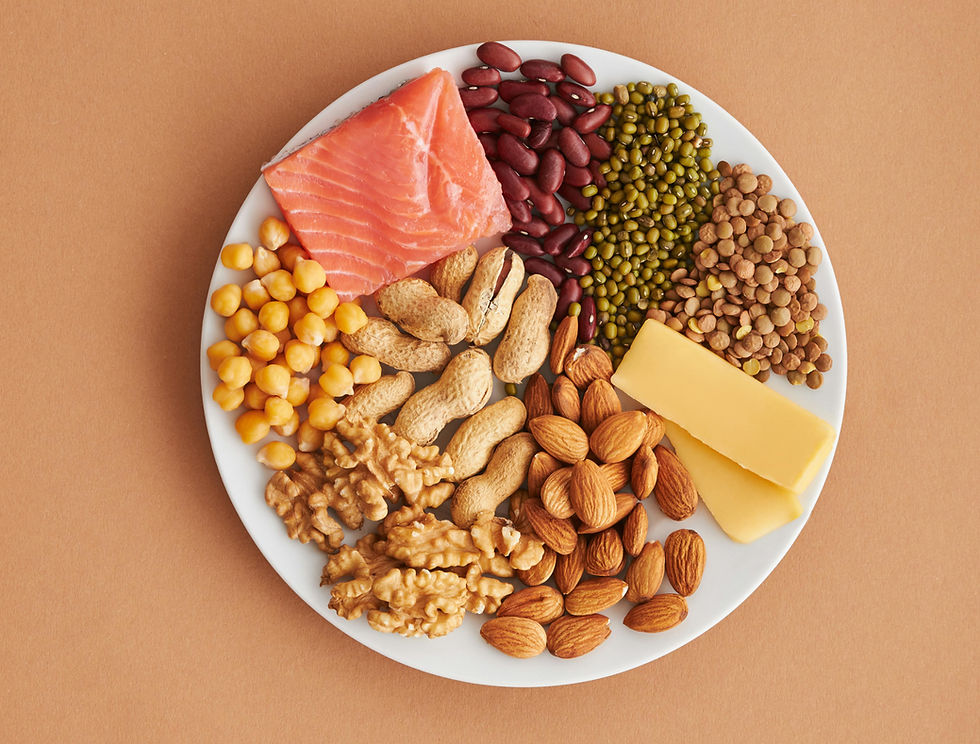The Power of Protein
- chriscadenaca8
- Apr 7, 2025
- 2 min read
With all the talk of high-protein, low-carb diets these days, you would think that being protein-deficient would be a rare concern. Not everyone consumes enough protein; in particular, people who are older or following a restrictive diet might not realize they are missing out on essential nutrients.
Protein is made up of building blocks called amino acids. Your body needs 20 different amino acids to function well, and nine of those must come from food. Protein is one of three macronutrients, besides carbohydrates and fats, that we eat to give us energy and that our bodies use in large quantities. It is found in fish, poultry, meats, eggs, legumes, and dairy products, as well as nuts and seeds.
Protein is so important because it is essential for a number of bodily functions, including stabilizing blood sugar, building and repairing muscles, and growing healthy hair and nails. It is also necessary to build essential substances in the body such as enzymes and hormones, as well as the antibodies that support the immune system. If your body isn't getting enough protein day to day, you could have low energy, weakness, or brittle hair and nails.
The text is already correct and does not contain any spelling or grammar mistakes.
Someone with a mild protein deficiency is more likely to have red, flaky skin, brittle nails with deep ridges in the nail beds, and hair that is dry or prone to breakage.
Protein plays a key role in helping you feel full and satisfied after a meal. Worse, your increased appetite might lead you to reach for foods that are high in carbohydrates and unhealthy saturated fats.
The muscles in our body contain protein, and a low protein intake can lead to loss of muscle tissue. This can be a problem, particularly in older adults who often consume less protein and are at greater risk of muscle wasting due to aging.
What if you follow a vegan diet?
There are many plant-based sources of protein, including tofu, beans, lentils, nuts, and seeds. Vegetables and grains contain small amounts of protein too. You could replace pasta with quinoa in your salad, add tofu to your vegetables, choose whole grain crackers and breads, or cook up a bean chili.
Should I take a protein powder?
If you're struggling to incorporate sufficient protein into your diet, a protein powder might be beneficial. You can include it in your breakfast, enjoy it as an afternoon snack, or use it to complement your meals to make sure you're fulfilling your body's daily needs.

Watford M, Wu G. Protein. https://www.sciencedirect.com/science/article/pii/21611831322012595?via%3Dihub
Saner C, Senior AM, Zhang H, et al. Evidence for protein leverage in a general population sample of children and adolescents. https://www.nature.com/articles/s41430-023-01276-w#citeas
HealthLink BC. Quick Nutrition Check for Protein. https://www.healthlinkbc.ca/healthy-eating-physical-activity/food-and-nutrition/nutrients/quick-nutrition-checkk-protein
Guo EL, Katta R. Diet and hair loss: effects of nutrient deficiency and supplement use. https://www.ncbi.nlm.nih.gov/pmc/articles/PMC531503



Comments